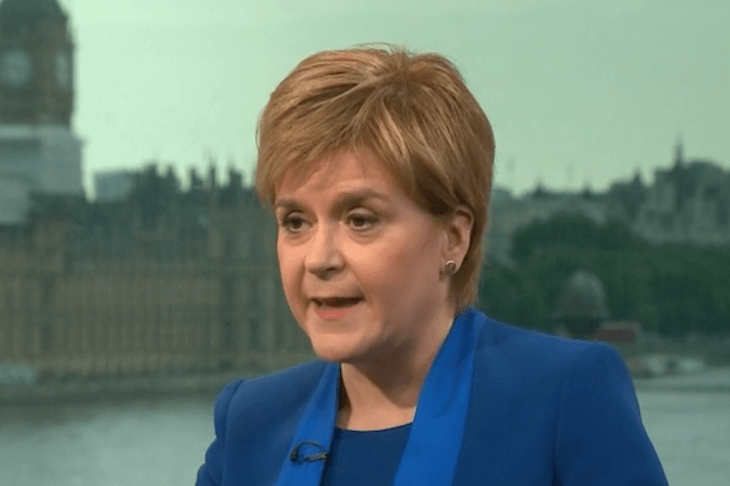This is a UK wide shift, not specific to Scotland, where the growth in entry rates from 20 per cent most disadvantaged young people has actually been lower over last decade than England.
2. NS: ‘I was talking to a head teacher in Scotland yesterday to talk about what he described as the life-changing impact of the pupil equity fund that we’ve introduced in Scottish education.’She’s referring to cash which is off-set by a reduction in support for local government, which in Scotland still runs schools. This might give head teachers an exhilarating sense of control but it doesn’t add up to a net increase in spending on schools.
3. Andrew Neil: ‘There’s no progress on what matters, which is reading, mathematics, science. Since 2006 on this, Pisa, the main international study, Scotland has dropped from 11th to 23rd in reading, 11th to 24th in maths, 10th to 19th in science. That’s a terrible performance isn’t it?’ NS: ‘Well, those statistics are from two years ago and I recognise those. They predate the reform programme that we’ve put in place.’A strange response: all data has a time lag, especially Pisa studies. And those figures still date from eight years into the SNP’s period in office, well into its so-called Curriculum for Excellence reforms.
4. NS: ‘We’re seeing the positive destinations of young people continuing to increase.’This ‘positive destination’ metric is a fairly recent SNP wheeze which, it recently turns out, includes the zero-hours contracts that Ms Sturgeon lambasts. Alex Massie recently described it as ‘anything except prison or the dole queue’.
5. AN: ‘Your own official body on literacy and numeracy came out with some pretty damning figures about what was happening there. And if you can’t get literacy and numeracy right I’m not sure what you can get right in education. Your response to the Scottish survey of literacy and numeracy [was to close it down].’ NS: ‘Because it’s a sample survey that is based on information on about 12 pupils per secondary school. What we are replacing it with is comprehensive data broken down not just by local authority but school by school.’This is a strange basis to dismiss a nationwide survey: take a dozen pupils from every secondary school in the land and you end up with a fairly decent sample size. It certainly large enough to convince professional statisticians that it was meaningful. But the SNP abandoned it. Could that be because this respected and independent survey was showing that things are getting worse?
6. NS: ‘I’m replacing [the Scottish survey of literacy and numeracy] with something that will give us not just sample data but data on every pupil in every school in Scotland.’So to recap: the SNP is ditching a survey carried out under controlled conditions at the same point in the year. Instead of this data-driven approach, it’s asking teachers what they think about every pupil, relative to a test which might have been taken at any point in the year. How on earth can such a survey be consistent and comparable? Teachers in schools that don’t do so well first time will evidently be under pressure to look more favourably on kids second time round. One thing’s for sure: in year two of these tests, the results will be better. But there’s no national system of moderation in place to assess impartiality.
7. AN: ‘Why did you cut maintenance grants for poorer students?’ NS: ‘We have got the best package of student support of any of the UK nations.’As if! Scottish students living away from home get less, sometimes far less, to live on than in Wales and England: if anything, Wales takes the crown for generosity as so much more of it comes as grant. Only two types of student do comparatively better in Scotland: those living at home (if they are happy to borrow, but it’s likely many live at home precisely to avoid that) and those over £54k who are being subsidised for an education their families could easily afford. What’s more, surveys show Scottish and English voters think the same on this: families who can afford to pay should pay. The difference on tuition fees on either side of the border does not represent a difference in how Scots and the English think about it: rather, it shows how the SNP is more willing to subsidise the better-off at the expense of the poorest students.
8. NS: ‘I don’t sit here and say that we are perfect and I don’t sit here and say that we don’t have challenges to face and work to do to face them. But what I will defend is the progress we’re making and also on things like student debt and student grants, that we are actually further advanced in many in these respects than any other part of the UK.’Really? In Wales, the top grant is £5,161 vs £1,875 in Scotland (or £875 for a mature student). In Wales grants are available for family incomes up to £50k, vs £34k in Scotland. The Scottish handling of living cost support (ie, hawking even more debt to full-time undergraduate poorer students) isn’t further advanced – it’s the unimpressive remnant that’s left when you decide to stick almost all your cash into fee subsidies.
9. [On access or poorer students to uni] NS: ‘That’s why we’ve established a Widening Access commission that is looking at how we make further progress.’Has she forgotten that this one-off Commission reported over in March last year, and that she promised (but failed) to respond within 12 months? The report has, finally, been released today.







Comments